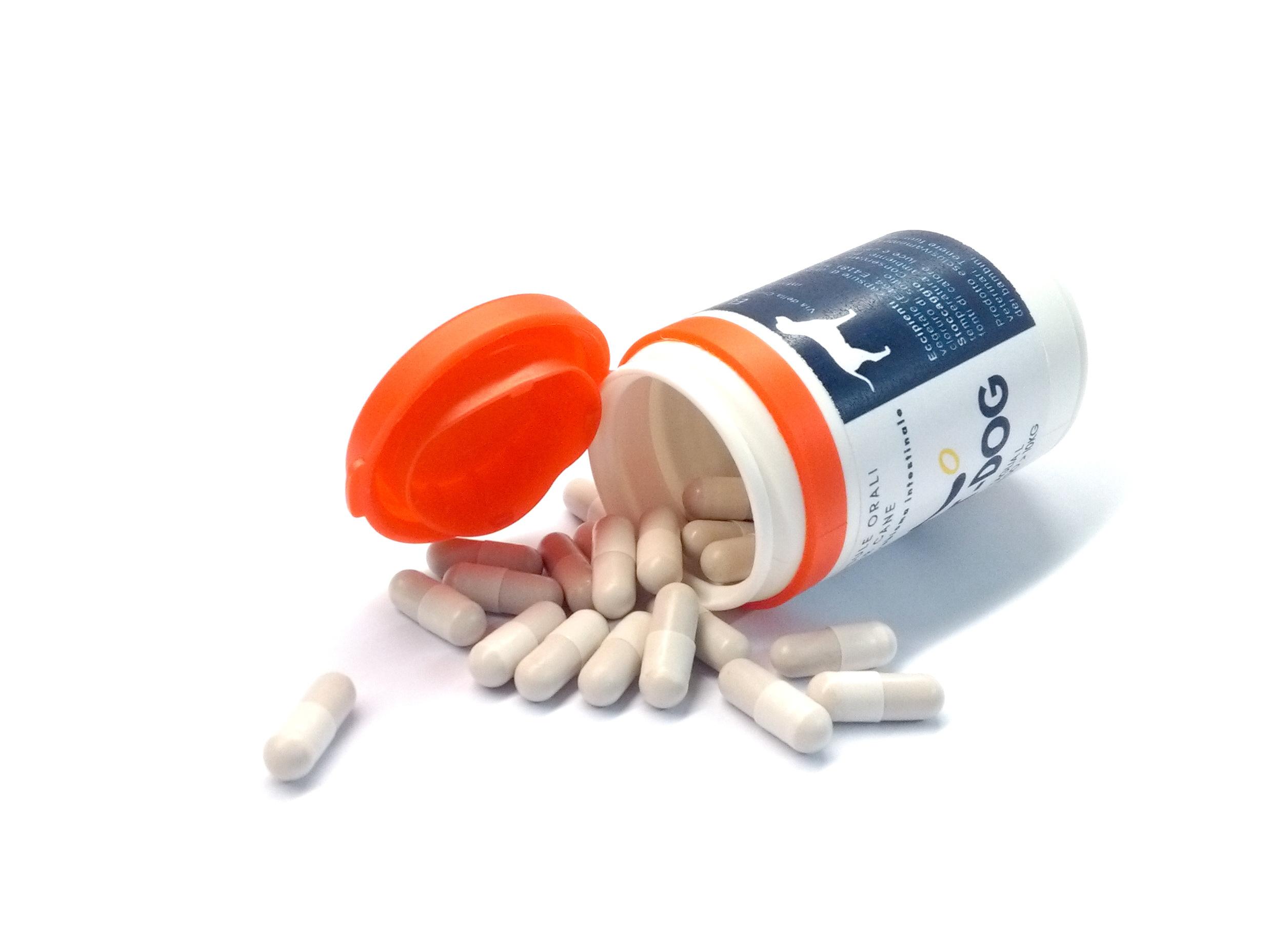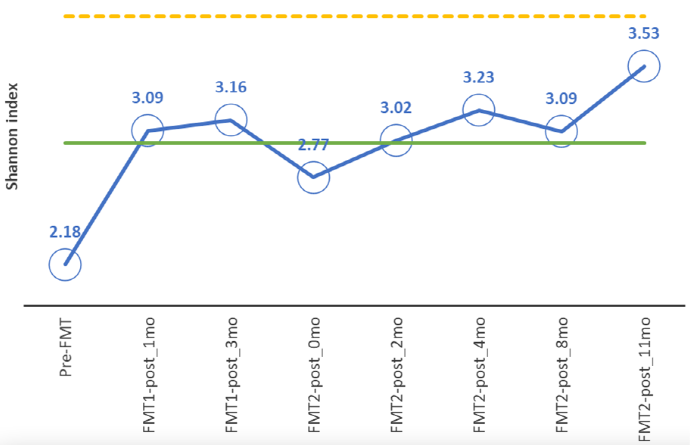FMT per cani e gatti enteropatici
Diarrea e vomito cronici possono dipendere dalla flora intestinale alterata.
Il trapianto di microbioma fecale può riportare l'equilibrio in modo semplice, sicuro e naturale.
Molto più di un probiotico!
Chronic enteropathies are characterized by an imbalance of the intestinal flora. We speak of DISBIOSIS of the microbiome.
When this happens the functions that the microbes perform are altered and contribute to the disease.Symptoms can be constant or recurrent diarrhea, vomiting, loss of appetite, loss of weight and liveliness, itching.
Il TRAPIANTO di MICROBIOMA FECALE (FMT) consiste nel trasferire i microbi di un animale sano in uno malato, con l'obiettivo di riportare l'equilibrio, ripristinare le funzionalità normali dei microbi e dell'organismo e così ridurre o eliminare i sintomi.
The Pet FMT Project allows a dog or cat with chronic enteropathy to access fecal microbiome transplantation.
80% of enteropatic pet that has FMT improve.
How fecal transplant works
The process is very simple:
-
A healthy donor is selected
-
The excreted feces are collected
-
The feces are treated and transformed into freeze-dried capsules
-
They are orally administered to the dysbiotic animal
The donor is subjected to stringent analyzes, both during the initial assessment and periodically.

How to access the fecal transplant
Ask
the veterinarian
Sign
the informed consent
Buy
Pet FMT Kit from the veterinarian
Sample
feces Pre FMT
FMT
pills administration
Sample
feces Post FMT
-
Ask your vet about microbiome transplantation and the Pet FMT project.
- Sign the informed consent that the vet presents to you.
-
Provide the veterinarian with the data required by the project.
- Purchase the FMT Pet Kit from your vet.
- Once you have received the FMT Pet Kit, read the instructions inside, everything is explained in detail.
- In the package, check that there are capsules and two containers for the Pet Microbiome Test.
- Get your first stool sample just before starting the FMT.
-
Suspend any probiotics at least 4 days before taking the fecal sample and for the entire period until the next sample.
- Administer the capsules as directed by your veterinarian.
-
Make the follow-up visit.
- Make the second stool sample 15 days after the end of the administration.
- Report any abnormal symptoms immediately to the vet.
FMT stories

Bruno
Bruno is a mixed breed dog who fell ill with chronic enteropathy at the age of 6. After trying various avenues, the owners decided to try the microbiome transplant. We have gone from a situation where Bruno had diarrhea with blood and vomiting every 3-4 weeks to today where all the symptoms of enteropathy have disappeared.One of Bruno's owners then founded EuBiome, to allow others to have easy access to this opportunity.The graph shows how Bruno's microbiome changed over the course of two transplants. The indices improve and move closer to the healthy ones (green line) and then to the microbiome donor (yellow line).The image taken from the scientific article published on Animals , april 2021.
Brian
Brian is a Doberman born in 2018, with recurrent chronic hemorrhagic diarrhea every 15-30 days from 2021 and severe weight loss. Thanks to his owner's love, the care of his veterinarian and the fecal transplant, Brian has grown from 28 kg to 36 kg in few months, regaining vitality and restoring serenity to all those who love him.
Brian was skin and bones. With the fecal transplant he is reborn !!
FAQ
- Who can access the transplant?
Dogs and cats with symptoms of enteropathy for at least 3 weeks. - Are there any exclusions?
Enteropathies due to parasites, neoplasms, endocrinopathies, dysphagia. - What does the FMT kit contain?
30 capsules of lyophilized microbiome from healthy animals and 2 collection kits for microbiome analysis. - How are the capsules administered?
As per the veterinarian's instructions, but generally one capsule a day orally, preferably between meals, with a morsel if necessary, for the duration of the treatment. - How are the capsules stored?
At room temperature protected from light and humidity. - Are there any side effects?
Rarely diarrhea, vomiting, flatulence, abdominal pain, which should resolve within 24--48 hours; in case suspend for 3-4 days and report to the veterinarian. - How can I get the transplant kit?
The kit can only be provided through the veterinarian, and only by participating in the Pet FMT Project. Ask your veterinarian. - Why do I have to join the Pet FMT Project?
Because in Europe, microbiome transplantation in dogs and cats is not yet regulated and is only performed as an experimental procedure. The project is a way to access microbiome transplantation immediately, as is the case for humans in clinical trials, and to support the development of knowledge that will allow for regulation. The Pet FMT Project is a research project for dogs and cats approved by the OPBA of the University of Padua. - What can I do in the meantime independently?
You can do the DisbiosiQuest, questionnaire that evaluates the likelihood that your pet has dysbiosis, or do the Pet Microbiome Test and have the photo of your intestinal bacteria and evaluate the dysbiosis from the real composition. - Can I check for dysbiosis before deciding whether to have the transplant?
You can do the DisbiosiQuestquestionnaire that evaluates the likelihood that your pet has dysbiosis, or do the Pet Microbiome Test. - What is the FMT Pet Kit Microbiome Test for?
The test has multiple uses: in the case of the Pet FMT Project, being done before and after the FMT, it allows to evaluate the effects of the transplant and the level of dysbiosis. - A cosa serve il Test del Microbioma singolo?
The
Pet Microbiome Testis used to identify and characterize dysbiosis before deciding whether to have a transplant or for post-transplant monitoring. - Why monitor the microbiome after transplantation?
Post-transplant monitoring with the Pet Microbiome Test, allows you to evaluate after some months if the microbiome is improving or if it is getting worse, as in the image above. The causes of chronic enteropathy often remain unknown and they may continue to act, even after an initial improvement. Be careful to the symptoms, do theDisbiosiQuest, periodically monitor the microbiome with the Pet Microbiome Test and in case, repeat the FMT. These are all useful tools to avoid returning back to the initial situation.